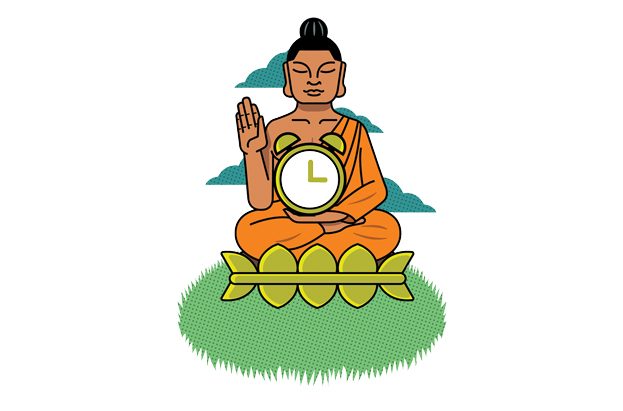Isn’t it about time somebody got awakened? Buddhism is all about enlightenment, right? The whole point is that it’s possible for ordinary human beings to entirely free their minds of greed, hatred, and delusion, once and for all. The Buddha did it. A lot of his followers did it. Presumably people have been doing it for 25 centuries. Who among us will fulfill the promise of this path and free our minds from suffering?
Many people are practicing Buddhism quite diligently these days by living lives of moral integrity, developing their minds through meditation, and gaining wisdom and understanding. A vast number of Buddhist texts are readily available, well translated, and freely accessible online. Teachers, meditation halls, study groups, and communities exist in great abundance and are within easy reach of most global population centers. So why haven’t we encountered more arahants, bodhisattvas, or buddhas? After all this practice, when does the show go on?
This is actually an old question that has been asked by Buddhists for centuries. It seems that during the Buddha’s lifetime there were many awakened ones, a fact attested both by the teacher himself and by the poems left behind by the first generation of his followers. Some say it was easier to accomplish the goal when the Buddha was alive, both because he was such a good teacher and because people were inspired by him to apply themselves with great commitment and energy.
Related: A Modest Awakening
Many Buddhist schools have expanded upon that view, saying that the dharma, clear in the early days, has been gradually diminishing with each generation as the message becomes more garbled, practitioners less capable, and the overall conditions of a “degenerate age” make it almost impossible for anyone to attain full awakening. Even so, surely some beings should be able to access awakening, the complete cleansing of the mind of toxins in one lifetime. And by this I mean full awakening, such as that which Gotama experienced under the Bodhi tree, not the “stage one” of stream-entry, or the opening of the “dharma eye” when one glimpses the truth that “whatever is of the nature to arise, is also of the nature to cease.” These experiences probably do happen more commonly today, but they are only early stages of a much more profound process of awakening.
Some place enlightenment on a continuum and would count even these entry-level experiences as “awakening.” Once the stream has been entered, it is inevitable that one will be carried on to the full liberation of the mind from suffering, so we might as well consider the task accomplished with the first stages of insight. And, of course, if indeed we all have buddhanature and are all in some important sense already awakened, then the whole question becomes irrelevant; perhaps even raising the issue demonstrates a fundamental lack of understanding. But labeling stream-entry as “awakening” strikes me as akin to an alcoholic saying he has already attained sobriety and just happens to be in the “falling down drunk most nights” phase of the process.
Still others may find the value of the Buddhist tradition to lie not in its final accomplishments but in its beneficial contributions to an ongoing process. It is enough to bring interdependent thinking to solve environmental challenges, lovingkindness to heal racial bias, compassion to help those in need, and insight into the constructed nature of it all to enhance social justice and bring about positive global change. So what if no individuals are really awakened, since Buddhism is contributing much of value to our collective awakening?
Related: Meeting Heartmind
But surely Buddhism can be held accountable for its promise to bring an end to suffering. Whenever a medicine is developed to cure an affliction, we expect to see its effectiveness demonstrated by the fact that patients have actually recovered. If the medicine of the dharma indeed heals the unhealthy roots of habitual human behavior, however, we have yet to see this demonstrated sufficiently in our own time.
I am among those who think awakening is attainable, even in this modern secular age, but it requires a level of commitment that few are willing to make. The teachings are rooted in an ascetic culture, and we generally want our Buddhist practice to enhance our life rather than challenge it. Sooner or later someone will have to demonstrate that awakening is possible. So Maitreya, wherever you are, it’s time to step forward and show us how it’s done.
Thank you for subscribing to Tricycle! As a nonprofit, we depend on readers like you to keep Buddhist teachings and practices widely available.
